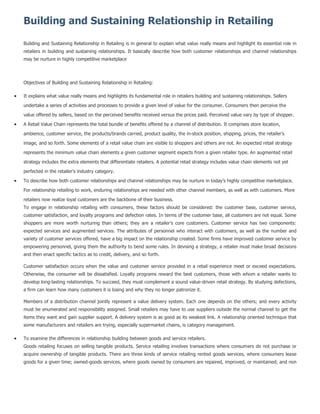
Building and sustaining relationship in retailing
- 1. Building and Sustaining Relationship in Retailing Building and Sustaining Relationship in Retailing is in general to explain what value really means and highlight its essential role in retailers in building and sustaining relationships. It basically describe how both customer relationships and channel relationships may be nurture in highly competitive marketplace Objectives of Building and Sustaining Relationship in Retailing: It explains what value really means and highlights its fundamental role in retailers building and sustaining relationships. Sellers undertake a series of activities and processes to provide a given level of value for the consumer. Consumers then perceive the value offered by sellers, based on the perceived benefits received versus the prices paid. Perceived value vary by type of shopper. A Retail Value Chain represents the total bundle of benefits offered by a channel of distribution. It comprises store location, ambience, customer service, the products/brands carried, product quality, the in-stock position, shipping, prices, the retailer’s image, and so forth. Some elements of a retail value chain are visible to shoppers and others are not. An expected retail strategy represents the minimum value chain elements a given customer segment expects from a given retailer type. An augmented retail strategy includes the extra elements that differentiate retailers. A potential retail strategy includes value chain elements not yet perfected in the retailer’s industry category. To describe how both customer relationships and channel relationships may be nurture in today’s highly competitive marketplace. For relationship retailing to work, enduring relationships are needed with other channel members, as well as with customers. More retailers now realize loyal customers are the backbone of their business. To engage in relationship retailing with consumers, these factors should be considered: the customer base, customer service, customer satisfaction, and loyalty programs and defection rates. In terms of the customer base, all customers are not equal. Some shoppers are more worth nurturing than others; they are a retailer’s core customers. Customer service has two components: expected services and augmented services. The attributes of personnel who interact with customers, as well as the number and variety of customer services offered, have a big impact on the relationship created. Some firms have improved customer service by empowering personnel, giving them the authority to bend some rules. In devising a strategy, a retailer must make broad decisions and then enact specific tactics as to credit, delivery, and so forth. Customer satisfaction occurs when the value and customer service provided in a retail experience meet or exceed expectations. Otherwise, the consumer will be dissatisfied. Loyalty programs reward the best customers, those with whom a retailer wants to develop long-lasting relationships. To succeed, they must complement a sound value-driven retail strategy. By studying defections, a firm can learn how many customers it is losing and why they no longer patronize it. Members of a distribution channel jointly represent a value delivery system. Each one depends on the others; and every activity must be enumerated and responsibility assigned. Small retailers may have to use suppliers outside the normal channel to get the items they want and gain supplier support. A delivery system is as good as its weakest link. A relationship oriented technique that some manufacturers and retailers are trying, especially supermarket chains, is category management. To examine the differences in relationship building between goods and service retailers. Goods retailing focuses on selling tangible products. Service retailing involves transactions where consumers do not purchase or acquire ownership of tangible products. There are three kinds of service retailing rented goods services, where consumers lease goods for a given time; owned-goods services, where goods owned by consumers are repaired, improved, or maintained; and non
- 2. goods services, where consumers experience personal services rather than possess them. Customer service refers to activities that are part of the total retail experience. With service retailing, services are sold to the consumer. The unique features of service retailing that influence relationship building and retention are the intangible nature of many services, the inseparability of some service providers and their services, the perish ability of many services, and the variability of many services. To discuss the impact of technology on relationships in retailing. Technology is advantageous when it leads to an improved information flow between retailers and suppliers, and between retailers and customers, and to faster, smoother transactions. Electronic banking involves both the use of ATMs and the instant processing of retail purchases. It allows centralized records and lets customer’s complete transactions 24 hours a day, 7 days a week at various sites. Technology is also changing the nature of supplier–retailer–customer interactions via point-of sale equipment, self- scanning, electronic gift cards, interactive kiosks, and other innovations. To consider the interplay between retailers’ ethical performance and relationships in retailing. Retailer challenges fall into three related categories: Ethics relates to a firm’s moral principles and values. Social responsibility has to do with benefiting society. Consumerism entails the protection of consumer rights. “Good” behavior is based not only on the firm’s practices but also on the expectations of the community in which it does business. Ethical retailers act in a trustworthy, fair, honest, and respectful way. Firms are more apt to avoid unethical behavior if they have written ethics codes, communicate them to employees, monitor and punish poor behavior, and have ethical executives. Retailers perform in a socially responsible manner when they act in the best interests of society through recycling and conservation programs and other efforts. Consumerism activities involve government, business, and independent organizations. Four consumer rights are basic: to safety, to be informed, to choose, and to be heard. Transtutors.com is an effort on the part of expert tutors to give you maximum support by way of pooling their subject knowledge exclusively for your understanding and knowledge enhancement. It is a highly accessible source of gaining understanding in subject of Management and getting effective homework help and assignment support in topics like Retail Management and Building and Sustaining Relationship in Retailing.